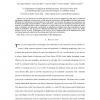Free Online Productivity Tools
i2Speak
i2Symbol
i2OCR
iTex2Img
iWeb2Print
iWeb2Shot
i2Type
iPdf2Split
iPdf2Merge
i2Bopomofo
i2Arabic
i2Style
i2Image
i2PDF
iLatex2Rtf
Sci2ools
113
click to vote
WINET
2016
2016
Practical large-scale coordinated scheduling in LTE-Advanced networks
—In LTE-Advanced, the same spectrum can be re-used in neighboring cells, hence coordinated scheduling is employed to improve the overall network performance (cell throughput, fairness, and energy efficiency) by reducing inter-cell interference. In this paper, we advocate that large-scale coordination can be obtained through a layered solution: a cluster of few (i.e., three) cells is coordinated at the first level, and clusters of coordinated cells are then coordinated at a larger scale (e.g., tens of cells). We model both smallscale coordination and large-scale coordination as optimization problems, show that solving them at optimality is prohibitive, and propose two efficient heuristics that achieve good results, and yet are simple enough to be run at every Transmission Time Interval (TTI). Detailed packet-level simulations show that our layered approach outperforms the existing ones, both static and dynamic.
Related Content
| Added | 11 Apr 2016 |
| Updated | 11 Apr 2016 |
| Type | Journal |
| Year | 2016 |
| Where | WINET |
| Authors | Giovanni Nardini, Giovanni Stea, Antonio Virdis, Dario Sabella, Marco Caretti |
Comments (0)

